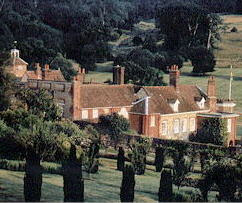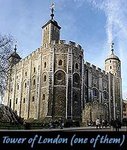 Dear Stan,
Dear Stan,After all my adverse comments on the Church of England, here is a very illuminating piece seeing the religious divide and the very survival of the CoE from an Anglican perspective. It is so long that I do not know if you wish to post it complete, though it contains more thoughts on the "Sharia Law" debate which has world-wide implications. This idea has already been tested in Ontario, just over the border from you.
Edmund Campion, whom he mentions, was a very local "English Martyr" who ran an underground Catholic press at Stonor House, about 12 miles north-east of my house. Stonor House has been the home of the same Catholic family for over 800 years. I visited it a few years ago. Part of the James Bond film "The Living Daylights" was shot there. If you check out the DVD, you see it when Timothy Dalton drives up to the "country HQ" of MI6. I asked one of the staff about the film crew visit and the reaction was "Never Again!!!" Although all British stately homes are desperate for cash, Stonor felt they could survive without the hassle of another blockbuster taking over the premises. But then a recent Stonor heir was chairman of Barclays Bank, so he happily had the loot to keep Stonor in good repair.
==================================================================
Is the Church of England finished? Should it be?
Peter Hitchens
I love the Church of England. By that I do not mean its bishops, its arid modern prayers and poetry-free, unmemorable modern bibles, nor its stripped and carpeted modernised churches, its compulsory handshakes, perky modern hymns or happy-clappy conventicles where everyone is saved. If I'm saved it was such a narrow squeak that I think it wiser not to go on about it, as the man said.
What I love is the wondrous Elizabethan settlement which refused to make windows into men's souls and allowed Catholics and Protestants to forget their differences in a rather beautiful ambiguity.
That settlement is expressed in several ways. It lingers in buildings, in books, in music, a sort of ghostly presence just within reach at certain times of day and in a few unravaged, unwrecked parts of this country. It also continues to survive as a body of thought, song and literature, quite immune from the peculiar bureaucratic organisation which currently uses the Church's name.
It is still often to be found in churches and cathedrals which - though sadly stripped of much loveliness - managed to retain and guard far more of their pre-Reformation mystery and art than in any other Protestant country.
 It is to be found in the 1662 Book of Common Prayer, itself quarried from Coverdale's Bible and from the later Authorised Version, written in the Golden Age of the English language by people who understood poetry, cadence, music and memory - and who were concerned to keep what they could of a much older heritage.
It is to be found in the 1662 Book of Common Prayer, itself quarried from Coverdale's Bible and from the later Authorised Version, written in the Golden Age of the English language by people who understood poetry, cadence, music and memory - and who were concerned to keep what they could of a much older heritage.I don't expect to carry Roman Catholics with me here, as they have long ago constructed a myth about the Church of England which is, like all good myths, rooted in truth but yet not entirely true. The torture and judicial murder of Roman Catholic martyrs such as Edmund Campion remain as a gory stain on Elizabeth and on the Anglican tradition. But Campion (as Evelyn Waugh's fine biography makes clear) sought his martyrdom and refused all opportunities to evade it.
 Thomas More and John Fisher were martyred by Henry VIII, not really over doctrine but over the King's desire to have his first marriage annulled, something which might easily have been done by the Roman Catholic Church under slightly different political circumstances. More and Fisher, now recognised as men of courage and integrity, perjured and judicially murdered, appear on the most recent Anglican Calendar of Saints.
Thomas More and John Fisher were martyred by Henry VIII, not really over doctrine but over the King's desire to have his first marriage annulled, something which might easily have been done by the Roman Catholic Church under slightly different political circumstances. More and Fisher, now recognised as men of courage and integrity, perjured and judicially murdered, appear on the most recent Anglican Calendar of Saints.And that is in spite of the fact that More himself was no mean persecutor of Protestants, sending several followers of Luther to die in the flames (for Henry VIII killed anyone who got in his way, Catholic or Protestant). He was not, perhaps, the near-perfect man portrayed in that matchless film 'A Man for All Seasons', but his courage - like that of his opponents - is amazing to us.
 I may be wrong, but I do not think that Thomas Cranmer is to be found on any such Roman Catholic calendar. Like many Anglicans, I've attended Roman Catholic churches and cathedrals for Mass (in which I don't take Communion because I think that I'm not entitled to do so, my beliefs being insufficiently clear on the subject, and also because I suspect that by doing so I might upset Roman Catholics) and for Vespers. But I have seldom found a Roman Catholic who knew much about Anglicanism or its services.
I may be wrong, but I do not think that Thomas Cranmer is to be found on any such Roman Catholic calendar. Like many Anglicans, I've attended Roman Catholic churches and cathedrals for Mass (in which I don't take Communion because I think that I'm not entitled to do so, my beliefs being insufficiently clear on the subject, and also because I suspect that by doing so I might upset Roman Catholics) and for Vespers. But I have seldom found a Roman Catholic who knew much about Anglicanism or its services.I also tend to think that the Roman Catholic concentration upon the English Martyrs ( the murals in the Brompton Oratory and St Aloysius in Oxford are particularly striking examples of this) are a bit of a propagandist 'you did it too' response to the rather larger persecution of Protestants by Mary.
And most of those who feature in Foxe's Book of Martyrs, the roll call of Mary's Protestant victims, were obscure and powerless people, not garlanded academics like Campion or great men like More and Fisher, but even so caught up in a great battle and compelled by circumstances to be heroic when they never meant to be.



